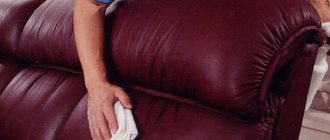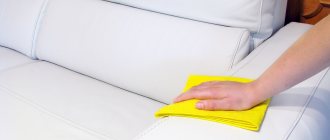We take care of furniture
Even the most pleasant and durable leather is at the same time the most finicky to care for. You should not eat fruit, drink wine or coffee on leather furniture: it will be difficult to remove stains from fallen drops. If the leather upholstery is light-colored (beige or white), you should not sit on it wearing jeans: poorly dyed fabric can leave dark stains. The same applies to bright pillows, blankets, coloring magazines and toys. It is also not recommended to place a sofa or chair near a window if the room is on the sunny side: under the influence of rays, the skin will quickly lose its elasticity.
Types of material
Of course, the best option is a sofa upholstered in genuine leather. This is wear-resistant furniture, it looks beautiful and retains its attractive appearance for a long time. To clean leather, it is not recommended to use products that cause the material to dry out. These are gasoline, acetone and other organic solvents. As a last resort, these substances can be used to remove local contaminants. After this, you need to apply castor oil to the cleaned surface, let it absorb and polish. This treatment will help soften the skin.
However, a sofa made of genuine leather is expensive; not everyone can afford to make such a purchase. An alternative option is furniture upholstered with artificial leather substitute. Do not confuse modern leatherette samples with cheap leatherette.
To make furniture, manufacturers use:
- Eco leather. This is a durable material that is difficult to distinguish from genuine leather. It can be cleaned with the same products as its natural counterpart, but organic solvents should be used with extreme caution.
- Aniline and semi-aniline leather. It has a soft shine and a pleasant elastic texture to the touch. The second option is more durable, but looks less natural. These types of artificial leather should absolutely not be cleaned with acetone and other organic solvents; its surface layer will be destroyed by such exposure.
- Vinyl leather. PVC coated material. It does not tolerate the effects of gasoline and acetone; it can be cleaned with alcohol-containing liquids, but with caution.
All types of leather do not tolerate high temperatures well, that is, they cannot be dried using heat (for example, hot air from a hairdryer). It is not recommended to use hot water for washing; you should use slightly warm water.
With artificial leather substitutes you need to be as careful as possible so as not to mechanically damage the polymer layer. That is, you should not use powders with abrasive particles, steel wool, or hard brushes. It should be remembered that artificial leather, unlike natural leather, cannot be restored, so mechanical damage will irreversibly damage the upholstery of the sofa.
Cleaning from dust
To care for the leather of the sofa, a vacuum cleaner is used, which rids it of its main enemy - dust. If you don't clean the upholstery once every two weeks, dust will clog the pores of the leather, making it even more difficult to get rid of dirt. The abundance of dirt significantly reduces the service life of leather products. When cleaning, use a soft brush to remove dust from folds and crevices. Suitable for both home and car vacuum cleaners. If you don’t have any equipment, you can use a special broom or a damp cloth. To add shine, you can soak a rag in a weak lemon solution and wipe the leather sofa with it.
We take care regularly
Immediately after purchasing furniture, you should purchase a leather sofa care product. Once a month it is necessary to wet clean the surface, but the use of aggressive detergents is prohibited! Do not rub the upholstery with brushes - it will leave scratches. For skin care, a special composition is selected, which depends on the type of material. Detailed instructions for caring for the product should be issued by the store along with the purchased furniture. You should not skimp on cleaning compounds that can damage the material: it is much more profitable to purchase an expensive product and keep the leather in its original form than to watch the upholstery age day after day despite constant care. It is recommended to first try an unfamiliar composition on an inconspicuous area.
Prevention is better and cheaper than cure. In order for natural leather furniture to look presentable longer and not become a breeding ground for harmful bacteria, it must be provided with regular care throughout its entire lifespan.
Once a year, leather furniture needs to be impregnated with a special fat composition so that the material does not dry out and remains soft longer. If you do not follow this rule, the upholstery will quickly “grow old” and crack. Do not treat your leather sofa with shoe creams or impregnations.
Caring for new suede shoes
After purchase, shoes only require preventive maintenance - they have not yet had time to suffer from dirt or dust. Sometimes, it becomes necessary to adjust the toe truss of a shoe (for example, for a protruding “bone”) or stretch the boot, increasing the fullness of the leg coverage - and this is also done at home, if we are talking about natural material.
The first measure for the care and preliminary protection of new suede shoes is deep impregnation of the product with an aerosol water-repellent agent, which is best purchased in the same company store where the pair was purchased. After the first layer has dried, the operation is repeated twice more.
Very important! You cannot go outside until the third layer of impregnation has completely absorbed and dried! The same can be said about products made of nubuck or velor. Subsequently, the impregnation must be periodically renewed, on average - once every 3-4 days with constant wearing of shoes
For further operation, it is enough to apply one layer of a protective substance
Subsequently, the impregnation must be periodically renewed, on average once every 3-4 days with constant wearing of shoes. For further operation, it is enough to apply one layer of a protective substance.
Folk remedies
The biggest problem is caused by shoes that don't fit well on the foot - wearing them is painful and unsafe, since due to improper compression in the shoe frame, the foot can become deformed. The following tips will help correct the situation:
- Moisten a cloth napkin in a 50% alcohol solution or pure undiluted vodka and blot the inside area of the “bone”, instep or sides of the bottom of the boots well (socks are not advisable). Light beer varieties can be used for the same purposes;
- A 30% vinegar-water solution is suitable for stretching the boot. Wet the inside of the boot with this mixture, then soak a cloth in the solution. Place the boot on the ironing board so that the inside of the boot is straightened, cover it with a damp cloth and iron it.
After using any of the methods for stretching shoes, you need to put on the tight product and walk around the house for 1-3 hours.
Professional products
When you just bought shoes and don’t know how to properly care for them, consult a specialist in a store or find the best deal on the Internet. Below are the best recommendations from the web for a new pair of suede updates:
- A special multi-component set from Saphir, which includes the most necessary equipment for home care of expensive suede: an eraser, Saphir Omni daim - a means for cleaning dirt, paint for deep penetration into pile leather, a rubber brush. The kit can be ordered on the official Saphir website, indicating what color paint you would like to receive. By default, the set includes black;
- Spray for instant protection Nano Protector not only cares for and gives the product a margin of safety, but also fixes the color of the shoes, preventing fading or the appearance of unsightly stains.
In order for new shoes to last longer, do not skip the most important, primary stage of processing.
We maintain the correct microclimate
When caring for leather furniture, it is important to consider two indicators to which the material reacts: temperature and humidity. You should not place furniture near radiators and heaters: the upholstery may become deformed. A leather item that is constantly exposed to hot appliances wears out faster and takes on an unkempt appearance.
In addition, genuine leather takes moisture from the air, which means that in a room where “capricious” furniture is located, humidity levels should not exceed 70%. Dry air makes the leather less wear-resistant: the fat layer is damaged, cracks appear on the material, and even the most expensive pieces of furniture begin to look cheap.
During a long absence, you should not cover the sofa with plastic film, which will create a greenhouse effect.
Find out which products are harmful to the skin
All skin needs moisturizing and cleansing. Folk remedies and professional preparations are suitable for this. But there are forbidden products that will only harm upholstered leather furniture:
| Alcohol-containing substances They dry out the skin. It may crack later |
| Bleaches and stain removers The use of such products will lead to a change in the color of leather furniture |
| Solvents They will ruin the appearance of the skin. It cracks and loses its elasticity |
| Abrasives Baking soda or powdered detergents scratch the skin. This leads to further cracks. |
Getting rid of stains
If a stain appears on the upholstery of a leather sofa or chair, do not apply chemical solvents, polishes, stain removers, abrasive pastes and powders to it: this will not only disrupt the structure of the material, but will also deprive it of its original color. The stain must be blotted immediately with a napkin. If you can’t deal with it with water, apply a special composition to clean the skin. Drying the stained area with a hairdryer is strictly prohibited! Experts also do not recommend using soapy water too often: it washes away protective oils from the skin.
If something goes wrong with your leather sofa and stubborn stains appear on its surface, it is best to contact a dry cleaner. This must be done as quickly as possible, because the longer the stain remains on the skin, the more difficult it is to remove it later.
To get rid of simple stains at home, use the tips of professionals:
- Traces of ink or felt-tip pen are carefully removed with cotton wool soaked in alcohol.
- Wine stains can be easily removed with a damp sponge or rag. Pink stains will come off if you wipe them with lemon juice.
- Fresh blood is quickly cleaned with a weak soap solution. Dried stains will heal if you gently clean your leather sofa with vinegar or lemon.
- Fresh chewing gum can be easily removed with a spoon, but dried gum will come off if you first apply ice to it.
- If a greasy stain appears on a leather sofa, you need to cover it with talcum powder, and after a couple of hours wipe it with a dry absorbent cloth.
Efficiency of use on various contaminants
Leather is a unique, natural and unique material. It does not have the property of self-cleaning and self-healing. Sunlight, humidity, temperature, human sweat, stains and other contaminants cause upholstery to age. If you do not clean leather furniture on time, then over time it will crack and begin to peel. But you can maintain the original appearance of the product thanks to effective cleaning products.
Common stains and means for removing them can be summarized in one table.
| No. | Stain type | Cleaning method |
| 1. | Ink | A solution of ammonia and water. One teaspoon of alcohol is diluted in 200 g of water. Moisten kitchen salt with this solution and place it on the ink stain until the mixture dries. Then remove the residue and wipe with a damp cloth. Instead of ammonia, you can use isotropil alcohol. |
| 2. | Felt pen, marker | Easily removed with cologne or adhesive tape. |
| 3. | Ball rod | Lemon juice diluted with water (1 teaspoon of juice + 50 g of water), cologne or adhesive tape. |
| 4. | Oil paint | Refined gasoline, solution of 1 tablespoon of citric acid in a glass of water. |
| 5. | Grease stain | Mix warm milk with baking soda until a paste forms, apply to the stain, and wipe off with a damp cloth. Water + baking soda + ammonia are also effective for greasy stains. Dilute potato starch with water to the consistency of thick sour cream and apply to the stain. Leave for 15 minutes and remove with a napkin, and then wipe with glycerin. |
| 6. | Dirty | Dilute 1 egg in 200 g of warm milk, wipe the dirty area, and treat with a thick soap solution. |
| 7. | Zelenka | Toothpaste or sticky tape will help. |
| 8. | Wine, blood or food | A solution of ammonia, water and hydrogen peroxide (250 g of water, 2 teaspoons of ammonia and 2 teaspoons of hydrogen peroxide); dissolve 1 aspirin tablet in 200 g of water; saline solution (200 g of water dissolve 1 tablespoon of salt) and wipe the stain. |
| 9. | Coffee, tea and juice marks | Make a thick soap solution, foam with chlorine-free dishwashing liquid, and apply to the stain. |
| 10. | Mold and mildew | Prepare a solution of 2 tablespoons of table vinegar and 200 g of water. Wipe the mold with the solution and immediately rinse with clean water and dry with a napkin. |
After cleaning the sofa with any folk remedy, the surface to be treated should be wiped with a napkin soaked in glycerin. Whatever method is used to combat pollution, you need to be careful in the process. On a white leather sofa, dirt appears more often than on dark and colored products. To maintain the whiteness of the material, some effective methods are used:
- Dirt on a white leather sofa can be removed with an onion cut in half. They rub it on the stains, and then wipe the treated area with a damp cloth;
- Warm milk is mixed with chicken protein and rubbed on problem areas on leather furniture;
- Rub white toothpaste onto the contaminated areas, leave for 15-20 minutes, and then remove the dried toothpaste with a damp cloth.
Ink
Markers
Pen
Oil paint
Fat
Dirt
Zelenka
Wine
Coffee
Mold
Protect from scratches
Caring for leather furniture involves not only regular cleaning, but also protection from all kinds of damage. If you have pets in your home, the surest way to protect leather furniture from claws is to keep pets out of the room. If this is not possible, you should consider a different type of upholstery.
You should not sit on a leather sofa with your feet on without first taking off your shoes. Furniture should also be protected during renovations.
It is impossible to restore a sofa without getting rid of severe damage on your own - you will have to turn to specialists for reupholstery and restoration. Minor defects on leather furniture can be eliminated using professional means, for example, “liquid leather”. They are sold in auto repair shops and also on the Internet. In order for the scratch to become invisible, it is necessary to select a shade as close as possible to the material. And you can completely restore the color of the product using a special spray paint.
Caring for a leather sofa or chair is a task that requires organization and accuracy. But the result is worth it: upholstery made from natural material, even after 10 years, will look as if the furniture was purchased just yesterday.











